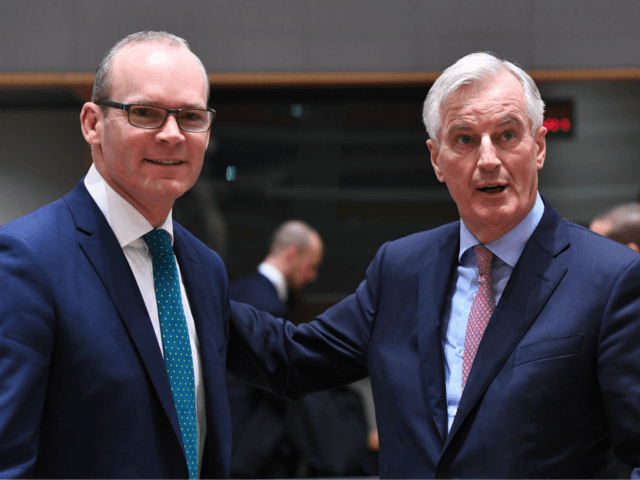Britain could be trapped in the European Union (EU) for even longer than the four years and nine months since the vote to leave that has already been agreed, it has emerged Wednesday.
The UK voted to leave the bloc in June 2016, but it took nine months to trigger Article 50, a two-year leaving process, which is then to be followed by a two-year “implementation period” agreed by the Prime Minister.
And on Wednesday, the Irish deputy prime minister (pictured, left) suggested extending the Article 50 period past the eight months remaining.
“If Britain asks for more time, and if that is necessary to get to a sensible agreement, well then we would support that, of course we would,” Simon Coveney said.
He told BBC Radio 4’s Today programme the UK had been “negotiating with itself” in the six months before the publication of Theresa May’s Chequers white paper plan.
“We now have clarity in terms of what the British government is asking,” he said. “I think there are elements of that that would be difficult to negotiate… but I think it is easier to achieve now.”
The Chequers plan demands the UK stay tied to all EU rules on goods, as well as collecting the EU’s higher tariffs on behalf of the bloc, which can be claimed back according to a “facilitated” arrangement.
POLL: Brits Overwhelmingly Reject Tory ‘Soft Brexit’ https://t.co/n5XdhqNfv3
— Breitbart London (@BreitbartLondon) July 23, 2018
However, Mr Coveney slammed Mrs May’s customs proposals as “complex”, due to the need to collect different levels of tariffs, questioning how it would be enforced and supervised.
He also dismissed the UK’s threats to leave the EU without a deal on World Trade Organization rules as “bravado,” adding: “The truth is that I don’t believe Britain can afford to have no deal on Brexit.”
There could be further delays to the Brexit process if pro-Brexit Tory rebels mount a leadership challenge against Mrs May as some have threatened to do since the Chequers plan was published.
After Mrs May snubbed the Brexit department Tuesday night and took control of negotiations, some Tory Brexiteers suggested there had been a “coup d’etat” by Civil Service bureaucrats pushing a “soft” Brexit.
PM’s Bureaucrats Officially Take Charge of Brexit Talks, Brexit Department Snubbed https://t.co/Ap8D6yq0Cu
— Breitbart London (@BreitbartLondon) July 24, 2018

COMMENTS
Please let us know if you're having issues with commenting.